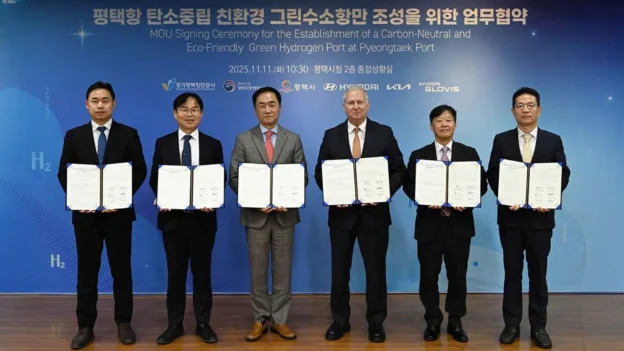Hyundai Motor Group announces plans to develop hydrogen port in Pyeongtaek. In collaboration with local authorities and strategic partners, the Korean group is committed to implementing a comprehensive hydrogen infrastructure to improve port logistics operations.
Future hydrogen port operations
The initiative involves the installation of power generators powered by hydrogen fuel cells. hydrogen fuel cell-powered power generators, operated by Kia Corporation and Hyundai Glovis, within Pyeongtaek Portoperated by Kia Corporation and Hyundai Glovis, within the port of Pyeongtaek. This infrastructure will be supplied by a 15-kilometer pipeline connected to a nearby production complex, ensuring a stable power supply based on clean energy.
For energy generation, the plan includes the expansion of port mobility through hydrogen-powered vehicles and machinery. It also foresees the installation of refueling stations and the adoption of Alternative Maritime Energy(AME) systems to reduce emissions from ships in port.
The collaboration between Hyundai Group and the city of Pyeongtaek has at its core the establishment of a hydrogen ecosystem from production to consumption. The involvement of entities such as the Gyeonggi Pyeongtaek Port Corporation and the Regional Bureau of Oceans and Fisheries reinforces the institutional focus of the project.
Since November 2024, Hyundai has been operating the first hydrogen-powered vehicle transport truck in Korea between its Asan plant and the port of Pyeongtaek. The project includes studies to integrate ammonia as an energy carrier and expand the green hydrogen supply chain through imports.
The implementation will be led by HTWO, Hyundai Group’s hydrogen business platform. This technological and logistical deployment seeks to strengthen carbon neutrality at the ports, and serve as a replicable model in other Asian regions.
This project aligns with the Korean government’s policies on hydrogen-based cities and ports, and represents a strategic advance in building a strong and functional hydrogen economy.
Source and photo: Hyundai

